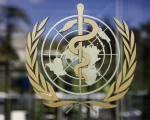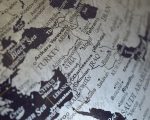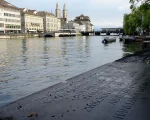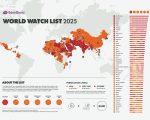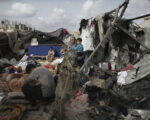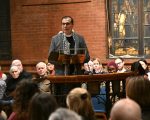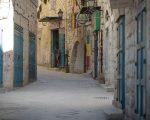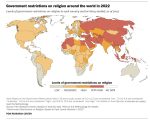Preacher’s Kid Refocused the World Health Organization on Social Justice
This issue of A Public Witness looks at the evolution of the WHO, its religious connections, and why it matters in the face of Trump ordering the U.S. to leave the valuable global agency.
Syrian Christians Want Their Identity and Freedoms Protected in Any New Constitution, Envoy Says
As Syria begins recovering from 50 years of autocratic rule by the Assad family, Christians and other religious groups expect their rights and freedoms to be preserved.
Five Centuries of the Radical Reformation
This issue of A Public Witness looks back at Anabaptism and what it still offers for Christians on the 500th anniversary of stirring the waters of a little fountain in Zürich.
1 in 7 Global Christians Faces ‘High-Level’ Persecution: Open Doors Report
Christians around the world are being attacked and killed, forced to flee and driven underground, the annual report finds.
Despite Growing Consensus, Many Jewish and Christian Groups Loath To Admit Genocide in Gaza
A growing list including the United Nations, Amnesty International, Human Rights Watch, Doctors Without Borders, and dozens of Holocaust scholars have concluded that Israel is committing genocide.
How Churches Helped Build and Give Away the Panama Canal
While Trump fantasizes about retaking the waterway, this issue of A Public Witness digs into American colonialism and the roles Christian leaders and denominations played.
What Would Bonhoeffer Do? Anti-Nazi Pastor’s Legacy Claimed, Debated Across Political Spectrum
He’s been widely quoted — and misquoted. People have claimed Bonhoeffer would support their side on issues ranging from the Vietnam War to post-9/11 militarism to same-sex marriage to the Jan. 6, 2021, insurrection.
In Bethlehem, a Christian Pastor Says a Year of Protest for Palestinians Shows Few Gains
Asked about Mike Huckabee potentially becoming the U.S. ambassador to Israel, the Rev. Munther Isaac called the prospect 'frightening,' adding, 'Huckabee presents himself, at least, as a man who does not live in reality.'
Bethlehem Plans Another Somber Christmas Under the Shadow of War in Gaza
For the second straight year, Christmas celebrations will be somber and muted: no giant Christmas tree in Manger Square, no raucous scout marching bands, no public lights twinkling, and very few public decorations or displays.
Report Ranks Countries Where Religion Faces Highest Government and Social Persecution
The Pew Research Center’s annual report on government restrictions on religion highlights that governmental attacks on religion and social hostility toward religion usually ‘go hand in hand.’

